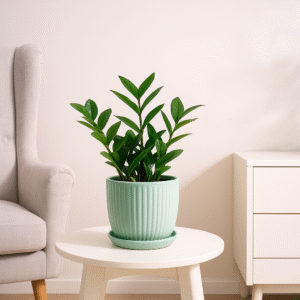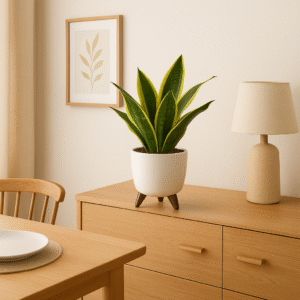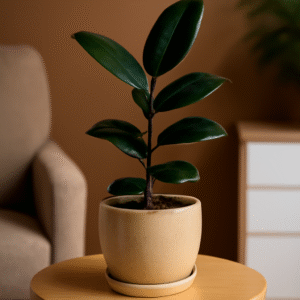Introduction
For centuries, Vastu Shastra—the ancient Indian science of architecture—has guided how homes and spaces can attract positivity, harmony, and prosperity. Plants play a vital role in Vastu because they bring life force energy (Prana) into our homes.
Choosing the right indoor and outdoor plants as per Vastu not only enhances the beauty of your home but also ensures that your surroundings radiate good health, happiness, and abundance.
Here’s a guide to the best Vastu Shastra plants for Indian homes, where to place them, and how to care for them.
1. Tulsi (Holy Basil)
- Vastu Benefits: Considered the most sacred plant in Indian culture, Tulsi is believed to bring spiritual energy, protection, and harmony.
- Placement: Always place Tulsi in the North-East or East direction for maximum positive vibrations.
- Care Tips: Needs 4–6 hours of direct sunlight; water daily during summer.
2. Money Plant (Pothos / Epipremnum aureum)
- Vastu Benefits: Known for attracting wealth, prosperity, and good luck. Its lush green leaves symbolize growth and renewal.
- Placement: Best kept in the South-East corner, ruled by Lord Ganesha and associated with finances.
- Care Tips: Grows well in water or soil, thrives in indirect sunlight, and needs minimal maintenance.
3. Bamboo Plant (Lucky Bamboo)
- Vastu Benefits: Symbol of longevity, peace, and prosperity. The number of stalks carries different meanings (5 = health, 8 = prosperity, 9 = good fortune).
- Placement: Ideal for East or South-East direction in the living room or office.
- Care Tips: Grows well in water; change water every 2 weeks for freshness.
4. Areca Palm
- Vastu Benefits: A natural air purifier that enhances vitality and creates a calming environment. It’s believed to ward off negative energy.
- Placement: Place in the East, North, or North-East corners for positivity.
- Care Tips: Prefers bright, indirect sunlight; water moderately.
5. Peace Lily
- Vastu Benefits: Brings peace, harmony, and happiness to households. Also reduces tension and promotes restful sleep.
- Placement: Best placed in the Bedroom or Living Room for calming energy.
- Care Tips: Needs indirect light; water weekly and keep soil moist.
6. Neem Tree
- Vastu Benefits: Symbolizes health, protection, and purification. It is believed to ward off negative energies and promote positivity.
- Placement: Should be planted in the North-West corner of the house or garden.
- Care Tips: Thrives outdoors with full sunlight; water regularly.
7. Banana Plant
- Vastu Benefits: Regarded as holy and associated with Lord Vishnu. Considered auspicious for prosperity and spiritual growth.
- Placement: Best in the North-East direction of a courtyard or garden.
- Care Tips: Requires rich soil, regular watering, and ample sunlight.
8. Aloe Vera
- Vastu Benefits: Known as a healing plant, Aloe Vera is believed to absorb negative vibes and promote good health.
- Placement: Keep in the East or North direction for maximum benefits.
- Care Tips: Needs bright sunlight and occasional deep watering.
9. Jasmine Plant
- Vastu Benefits: Famous for its sweet fragrance, Jasmine is associated with love, positivity, and good relationships.
- Placement: Best placed near the South-facing window or balcony.
- Care Tips: Requires direct sunlight and regular watering.
Plants to Avoid in Vastu
Not all plants are considered auspicious in Vastu. Avoid these indoors:
- Cactus/ Thorny Plants (except Roses) – believed to bring disputes.
- Bonsai Plants – may symbolize stunted growth and restricted progress.
- Dead/Dry Plants – carry stagnant energy and should be removed immediately.
Tips for Vastu-Friendly Plant Arrangement
- Healthy plants = positive energy. Always keep plants well-nourished.
- Natural pots: Use terracotta, ceramic, or bamboo instead of plastic.
- Balance greenery: Don’t overcrowd spaces—leave room for energy flow.
- Morning rituals: Watering plants early in the morning attracts good vibrations.
Conclusion
By aligning your indoor and outdoor greenery with Vastu Shastra principles, you invite not just beauty but also positivity, harmony, and prosperity into your life.
Whether it’s the sacred Tulsi, the prosperity-bringing Money Plant, or the calming Peace Lily, the right plants can transform your home into a hub of wellness and abundance.
At The Tarva, we bring you carefully nurtured plants that combine the wisdom of tradition with modern sustainability—because your home deserves both positivity and style 🌱✨.




